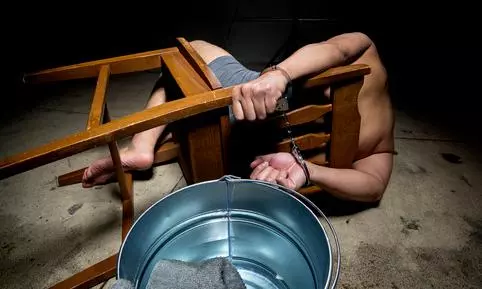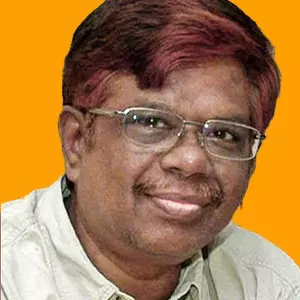
- Home
- India
- World
- Premium
- THE FEDERAL SPECIAL
- Analysis
- States
- Perspective
- Videos
- Sports
- Education
- Entertainment
- Elections
- Features
- Health
- Business
- Series
- In memoriam: Sheikh Mujibur Rahman
- Bishnoi's Men
- NEET TANGLE
- Economy Series
- Earth Day
- Kashmir’s Frozen Turbulence
- India@75
- The legend of Ramjanmabhoomi
- Liberalisation@30
- How to tame a dragon
- Celebrating biodiversity
- Farm Matters
- 50 days of solitude
- Bringing Migrants Home
- Budget 2020
- Jharkhand Votes
- The Federal Investigates
- The Federal Impact
- Vanishing Sand
- Gandhi @ 150
- Andhra Today
- Field report
- Operation Gulmarg
- Pandemic @1 Mn in India
- The Federal Year-End
- The Zero Year
- Science
- Brand studio
- Newsletter
- Elections 2024
- Events
- Home
- IndiaIndia
- World
- Analysis
- StatesStates
- PerspectivePerspective
- VideosVideos
- Sports
- Education
- Entertainment
- ElectionsElections
- Features
- Health
- BusinessBusiness
- Premium
- Loading...
Premium - Events

Police encounters, custodial torture reflect brazen flouting of NHRC guidelines and constitutional procedures; it's high time enforcement personnel were reined in
A complaint lodged by a woman devotee at a temple situated in a rural village in south Tamil Nadu, and the subsequent action taken by the police with lightning speed, resulted in the alleged torture and death of a security personnel named Ajith Kumar.
Ajith Kumar was suspected of stealing the devotee's jewellery at Tiruppuvanam, in Tamil Nadu's Sivaganga district. The alleged horrific torture and third-degree methods that ensued to extract a confession eventually led to the youth’s death, the postmortem report suggested.
The subsequent public interest litigation (PIL) before the Madurai bench of the Madras High Court, which directed the submission of all the papers including the postmortem report, revealed the youth had suffered more than 42 injuries all over his body.
Stalin outwits Opposition
By the time the Opposition parties could mobilise themselves to act, Tamil Nadu Chief Minister MK Stalin simply outwitted them. He got six constables arrested, suspended one deputy superintendent of police, and kept the superintendent of the Sivaganga district, where the death happened, under compulsory wait.
The NHRC clearly held that the police responsible for encounter killing cannot be allowed to go without due enquiry. Every encounter killing is also a murder and the justification or otherwise has to be decided on only in a proper trial before a judicial forum.
Even before any demand for compensation could crop up, he not only gave employment to Ajith Kumar’s brother but also gave three cents of land to the family to build a house. Contrary to normal practice, Stalin rang up the family of the dead and expressed his condolences and apologies over the phone.
Meanwhile, everyone began to blame the police for torturing the youth without formally registering an FIR against him or constituting a special team to unearth the stolen jewellery.
Also read: TN custodial deaths: Human rights activist slams police-politician nexus
Since the local police may be suspected of bias while conducting an investigation against the errant policemen, who have been arrested and lodged in the Central Prison in Madurai, the Chief Minister unilaterally announced handing over the criminal case to the CBI.
This took the wind out of the political campaign launched by the Opposition — the AIADMK and the BJP. It was surprising to note the BJP’s statement taking exception to handing over the investigation to the CBI, especially with assembly elections set for 2026.
The disquieting factor
For many questions raised by the two judges of the Madurai bench hearing the case, the government counsel had no answers.
A disquieting trend is the steady rise in police station torture of accused persons, and their killing in fake encounters.
Shortly before the DMK government assumed office in 2021, a deeply disturbing incident occurred in Sathankulam, where a father and son — both local traders — were allegedly tortured while in police custody. The remand magistrate ordered their judicial custody without even seeing the injured duo.
Also read | Exclusive: Ajith Kumar postmortem report describes horrific torture
It was only when the prison staff refused to admit the two in the prison since they were lifeless that the incident triggered outrage and all-round indignation.
The policemen in that case are now facing trial on murder charges on the basis of a CBI probe. The trial has come to an end and the verdict is expected anytime now, even though the terrible incident happened more than four years ago.
Rising custodial violence
Between the Sathankulam case in 2021 and Sivaganga in 2025, there have been as many as 24 incidents of custodial violence and encounter deaths in Tamil Nadu. This is one of the highest numbers nationally.
While people expect quick solutions to any crime and at times even welcome encounter killing by the cops, the cry for strict adherence to due procedure for deduction of crimes is least heard.
Also read | Sathankulam to Salem: Brutal cops indulge in atrocities with impunity
The National Human Rights Commission (NHRC), which once heard the complaints of encounter killings of Maoists in the undivided state of Andhra Pradesh, had given a set of guidelines on the issue.
The NHRC clearly held that the police responsible for encounter killing cannot be allowed to go without due enquiry. It ruled that every encounter killing is also a murder and the justification or otherwise has to be decided on only in a proper trial before a judicial forum.
At best, the police’s claim of acting in self-defence is the only plausible explanation, which has to be evaluated and accepted by the court. Otherwise, the policemen involved must be held accountable and punished for their excesses.
No uniform procedure
This NHRC directive mostly remained on paper and only when the courts intervened, the guilty policemen were tried for the murder of innocents in the name of encounter by way of self-defence. There is no uniform procedure developed either by the Centre or by any state government, in the matter of encounter deaths.
After a Hyderabad incident involving the rape of a woman veterinarian, some youths were picked up and killed by the local police, in what was labelled as a defence encounter. The Supreme Court appointed a Commission-in-Inquiry led by Justice VS Sirpurkar (a retired judge of the Supreme Court).
The report exposed the shady role played by the police, and the cops involved are now being prosecuted.
Ad hoc solutions
One cannot always wait for ad hoc solutions and it’s time for the lawlessness among the policemen to be reined in by law.
Perhaps, the way to forward is like what happened in the Tiruppuvanam incident — after the youth Ajith Kumar’s death, the state not only voluntarily transferred the case to the CBI, but also undertook rehabilitation measures for the victim’s family, including the CM himself apologising for the unfortunate death.
Watch | 4 years, 18 police encounters, 21 deaths: A tale of missing accountability in TN
More than anything else, an institutional framework has to be drawn up so that encounter killings will not be a solution for crime deduction and punishment of suspected criminals.
Bring in civil society
While police stations are fitted with CCTVs (many times they don’t work), the torture spots now are increasingly private buildings and gardens.
It is not enough to merely provide orientation to the policemen in their training academies and sensitise them, or ensure constitutional safeguards granted under Article 21 and 22 of the Constitution are maintained.
It is high time the uniformed law enforcing agencies are also brought under the control of civil society.
Just as there are jail ‘visitors’ from civil society to make frequent visits to the jails, there must also be committees of civil societies attached to each police station. A constant vigil must be maintained.
DK Basu guidelines ignored
The Supreme Court guidelines laid out in the DK Basu case (1996) regarding the rights of a pre-trial accused, and the nature of punishment for the violators, must be strictly implemented. However, the first person to examine such violations are the remand magistrates, who at times fail in their duties in preventing any transgression of law.
Also read | How Chennai cops used a pair of shoes to nab career criminals from Mumbai
Even the high courts which are to punish them as per the DK Basu guidelines have hardly initiated any action against their own members of the extended judicial family for reasons best known to them.
If this is not done administratively by the high courts, then what will be the use in publicly censoring the errant governments in judicial hearings? This censure will remain merely as part of the records and the administration of the criminal justice system will continue to be suspect in the minds of the people.
(The Federal seeks to present views and opinions from all sides of the spectrum. The information, ideas or opinions in the articles are of the author and do not necessarily reflect the views of The Federal.)


